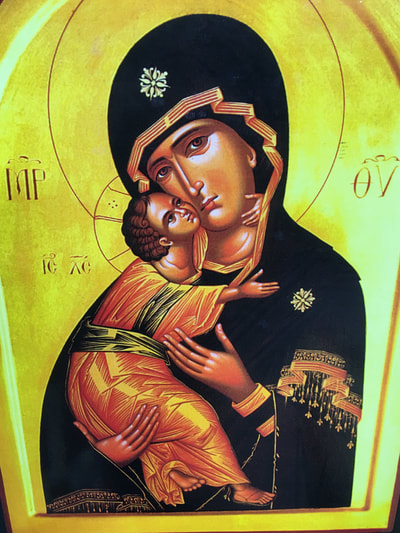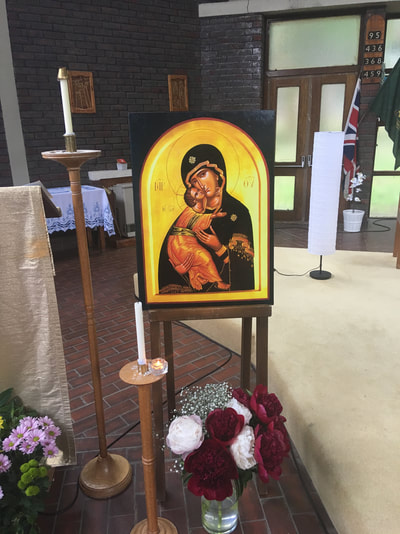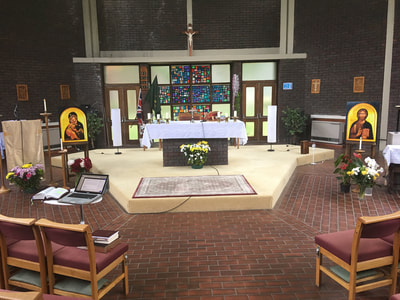Our Biblical Blog /'Examined Life'
|
SAINT AUGUSTINE'S, GRAHAME PARK
|
Again, we can see a masterful composition in today’s two readings. The Book of Samuel (1:8) is concerned with ‘big’ history. The people of Israel decide to have a king over them in the fashion of other nations. With this, they hurt God, whose pain is recorded: ‘They have rejected me, that I should not reign over them.’
In contrast to this wider history, James’ letter focuses on the ‘smallest particle’ of big history: the human tongue. We tend to think that the big decisions are made at the top levels of this vast edifice. No. The Spirit makes us refocus on where the big waves of history start their movement: the human lips. ‘Even so the tongue is a little member…Behold, how great a matter a little fire kindleth! And the tongue is fire, a world of iniquity: so is the toungue among our members, that it defileth the whole body, and setteth on fire the course of nature; and it is set on fire of hell. … But the tongue no man can tame; it is unruly evil, full of deadly poison.’ The tongue, this sub-atomic particle of history, indeed can set on fire ‘the whole body of history.’ In our icon of the Loving Tenderness (I have never paid attention to it before), the centre of the icon is, actually, the lips of the child Jesus and Mary. There is a holy silence between them. It is a sacred silence of Love. It is silence to us, but there is a full conversation of Love going on, continuously, ‘invisible’ to our perception. We humans, with our wounded human history, are invited to enter into this healing silence. We can learn from this hidden centre of the cosmos to imitate the ‘proper functioning of the tongue.’ We can learn the language of no-harming, forgiveness, reconciliation and compassion. (In the Vladimirskaja icon, in the assist-golden-rays on the Child’s cloth, we can contemplate how this healing flow enfolds and grows, wishing to encompass the whole of human history.) These lips can become the centre of history. When it happens, history (uncontrolled, constantly in flux) becomes salvation history. What a privilege, to have this revelation in our churches, in front of our eyes, in this holy icon! (The Christian tradition says, that the Church was born from the side of Jesus, from his wounds. Salvation history is born from these lips, between Mother and divine Child.) When we bring our bruised personal histories before God, these two lips are also the hidden centre of our personal being healed. It is possible to go back to the origin of our words-personal history. We can re-embrace our truer, genuine self, intended by God by contemplating Mary’s and Jesus’ healing conversation. And back to the wider picture, our Church, our fragmented churches, are also invited to go back to this very source of the ‘Catholick’, the wholeness of the community Christ intended for (and out of) his disciples. 31.05.2018. The loss of the Ark of the Covenant (1 Samuel 4)/Wednesday after Trinity Sunday, Matins, BCP/5/30/2018 One of the most painful and moving passages of the Bible is the loss of the ark of the covenant. This is an icon of pain. It points to the profound mourning over the loss. The whole community is shaken to its core. ‘Let us fetch the ark of the covenant of the Lord out of Shiloh unto us, that, when it cometh among us, it may save us out of the hand of our enemies.’ ‘Eli sat upon a seat by the wayside watching: for his heart was trembled for the ark of the Lord.’ ‘And the messenger answered and said, Israel is fled before the Philistines,…and the ark of God is taken.’ ‘And his daughter in law…named the child I-chabod, saying, The glory of God is departed from Israel: because the ark of God was taken.’
There is so much to meditate on the life-giving function of that ark. What is the equivalent of that ark in our lives? What would we count, as a community, as a loss of similar scale? Since we have the holy icons here at Saint Augustine’s, they manifest the power of the ark of covenant, through the mysterious presence they create. Christ, our Lord, who is the judge of the world radiates the gentlest and at the same time most concentrated Life. This Presence communicates with us. The golden background around Jesus’ body dazzles us, and pulsates an unexplainable and inexhaustible Light of love. It is a privilege to have the ark-like presence of the God of History. And most strangely, this dazzling brightness of the Son pulsates with a message. It sends us out, to see and visit people and clothe them in His healing light. This love will touch the local community, and gently, slowly, invite them to close to this Light. And be part of this Covenant. (Our second reading, the letter of James gives us a practical way of finding the lost ark: good deeds, the daily service in the church for others, re-energises our love.) 29.05.2018 The two icons invite us to contemplate the 'invisible strings of grace', the 'ascent', which is offered to our world every single day....
‘Now Eli was very old, and hear all that his sons did unto all Israel; and how they laid with the women that assembled at the door of the tabernacle of the congregation. And he said unto them, Why do you such things? For I hear of your evil dealings by all this people. Nay, my sons; for it is no good report that I hear: ye make the Lord’s people to transgress.’
It is an amazing contrast: the sons of an Old Testament divine show utmost corruption. There is a warning underlying our text: indeed, within one generation a complete moral fall can take place. Our human face can be lost and we can become the opposite of our true self. However, there is a positive reading of the story of Eli’s sons. There is always an immediate and complete healing on offer. Grace, by its nature, wants to restore us every minute to our full potential. Standing in front of the holy icons, one can contemplate and feel, this continuous ascent offered to our world. The upright posture of the figures of Our Lady in the icon of the Loving Tenderness, and the half-figure Christ Pantocrator (Ruler of All), points ‘upward’. The ‘vertical axis’ of their bodies make this healing ascent visible. Our ‘world of Eli’s sons’ are to realise that we life in the midst of these invisible strings of grace, and streams of Healing Divine Love… asking us to chose the elevation of our thinking and ways of life into realm of our truer selves. 29.05.2018 Isaiah’s story contemplated in front of the icon of the Loving Tenderness (1 Kings 19,1-18)5/23/2018 Prophet Elijah is just about to give up all hope in the God of the Covenant. In his region, all deserted to other gods. Only he was left: ‘I only, am left; and they seek my life.’
Then, God gives a demonstration where to find Him. ‘And, behold, the Lord passed by, and a great and strong wind rent the mountains, and brake in pieces the rocks before the Lord; but the Lord was not in the wind.’ Neither was he in the earthquake or in the fire. Instead, God appeared to Elijah in ‘a small voice’. From this ‘small voice’, which is quieter when the leaves of a tree just start moving in the breeze, Elijah learns to have hope in God again. It turns out that he is not alone at all: ‘Yet I have left me seven thousand in Israel, all the knees which have not bowed unto Baal, and every mouth which hath not kissed him.’ This is an important message for us, Christians of today. When local churches struggle with numbers, and feel their sacred prayers being disconnected from the life of our world - this image of God’s intimate consolation emerges. God’s goodness has never completely withdrawn from people’s life. There is an unbroken potential in our contemporaries not to ‘bend their knees’ in front of the false gods of the age. The message of the Eucharist by which we live daily is the confirmation of our individual hope. The icon of Loving tenderness, which now stands in Saint Augustine’s (the Romanian Orthodox Church will try to build a missional community, and will use our liturgical space for their Sunday worship) speaks about this positive hope – in ‘small voice’. We see Our Lady and the child-Logos Jesus in a loving intimate embrace. What a powerful statement of that hope, which Elijah does not have at the moment of crisis. Mary clings to the growing divine Life, that of the Child, in his arms. The world might be in disarray…Yet the trusting embrace between Mother and Child connects us with ‘the seven thousand in Israel’, with the ‘seven thousand in the Kingdom of God’. In salvation history, we are never alone, we have never been abandoned by God. Actually, we will start seeing the world around us as Mary and Jesus saw it: in tenderness, full of potential divine life and human flourishing. Seeing the Kingdom where it is not obviously present for the limited human eye – that is the art of God. To this ‘art of hope’ we are called. Let us collect the sparkles of hope and rejoicing, let us magnify them and return these elements of life to God. The kingdom of God, this is the miracle, grows through these ‘minuscule’ fragments. 23.05.2018 “In that he saith, A new covenant, he hath made the first old. Now that which decayeth and waxeth old is ready to vanish away.”
The emphasis is not so much on the ‘disappearance’ of the Old Testament but on the importance of renewing our existing covenant with God. This new covenant, radiates a healing peace and a reassurance, that our relationship with God is permanent! (Consequently, our task is keeping it alive through our daily, hourly!, efforts.) ‘I will put my laws into their mind, and write them in their hearts: and I will be to them a God, and they shall be to me a people.’ Let us focus on the precious moments of covenant making… Through these daily (hourly) tasks, we are also working on the unity of the church. Hebrews 8, when carefully contemplated, reveals the importance of reigniting/creating this desire for unity. Sadly, there is little appetite in practice, for healing the wounds of a fragmented Christianity. 16.05.2018 'Come and get killed by Baal!' or Kill your soul! Wow. Amazing in the present climate. Perhaps the underground should start to glamourise knives as well as guns
There is a fantastic definition of the Eucharistic community. The local Christian community is one ‘which is giving itself up to God’s love’. It is this self-offering that makes us Christians belonging to the new, and not to the old, creation. (Zizioulas, Being as Communion).
Our communal experience of giving ourselves up to God’s love in the Eucharistic worship is a crucial one. Through this surrender to the Source of Life, we are no longer dissolved in the faceless inertia of the culture in which we live. For this is what individuals and communities suffer most: the inertia, the impersonal inertia of ‘this world’. In this ‘telos-less’ sea (where there is no purpose, no ultimate meaning, no ultimate responsibility and accountability), it is impossible to have an identity. The soul and the heart gets ultimately inflated. In the ‘old creation’, the human person ceases to be grounded in love. No wonder that the sense of God, the desire for worship disappears from social consciousness. Our first reading, Judges reminds us of the effort that one must make in order to have God’s (love’s!) revealed Presence. ‘And the Lord said unto Gedeon, Take thy father’s young bullock, even the second bullock of seven years old, and throw down the altar of Baal that thy father hath, and cut down the grove that is by it; and build an altar unto the Lord thy God upon the top of this rock.’ (Judges 6,25-end) Our second reading invites us to reignite our trust in God’s promises. This awareness is particularly important in a culture which is defined by ‘zero talk about the Biblical God.’ It is only through the mentioned conscious act of ‘giving ourselves up to God’s love’, that these promises will come alive and support us - on our journey, facing ‘this world’. Becoming a Eucharistic community is not an option. This is the only gateway to survive and not to be dissolved, and melted into the images of ‘the faceless gods’, which is our age. Let us ‘feel’ the healing power of God’s promises. ‘For God is not unrighteous to forget your work and labour of love, which ye have shewed toward his name…’ (Personally, as far as I understand things when trying to make sense of my experiences, this rediscovering what the Eucharist means, and it compels us to do, is the only option for the ‘renewal initiatives’ of the Church of England. The new forms of mission, ‘fresh expressions’, will lose impetus and life, if they don’t intend to become Eucharistic communities; and defined by the Eucharist. The point I am making is that the Eucharist will reveal a hole ‘programme’ to learn about and internalize. Attempts of renewal remain groundless, if we are not facing the ‘Catholick DNA’ of the Church. There is a lot to reflect on what this ‘Catholick DNA’ is…) 13.05.2018 The imitation of God is fragile (Judges 2,6-end, Friday After Ascension Day, BCP Lectionary)5/11/2018 ‘…And there arose another generation after them, which knew not the Lord, nor yet the works which he had done for Israel…And the children of Israel did evil in the sight of the Lord, and served Baalim: and the forsook the Lord God of their fathers.’And all this happened after the faithful generation under the leadership of Joshua, after they had entered the promised land.
Forgetting the ‘Sacred meaning of life’ happens so easily to us. This is a symbolic verse: when a generation of religious observance disappears how the next generation is in steep decline. Spirituality, sacred wisdom, ‘unity’ disintegrates. They ‘followed other gods, of the gods of the people that were round about them, and bowed themselves unto them, and provoked the Lord.’ This also points to that the nature of the human being is to ‘mirror’ its social and cultural milieu. That is why it is important to mirror the otherness (one-ness!) of our God. We, Christians need to live with a sense that ‘God is our environment’. We should teach our children that the imitation of God is fragile. May the joy of faithfulness lead us and bring upon us a renewal of our faith! 11.05.2018 |
Soliloquy
These are verbal Icons, expressions of how the world is seen from Saint Augustine's.. Archives
June 2023
Categories |
||||||||||||||||||||||||||||||||||||
Proudly powered by Weebly




 RSS Feed
RSS Feed